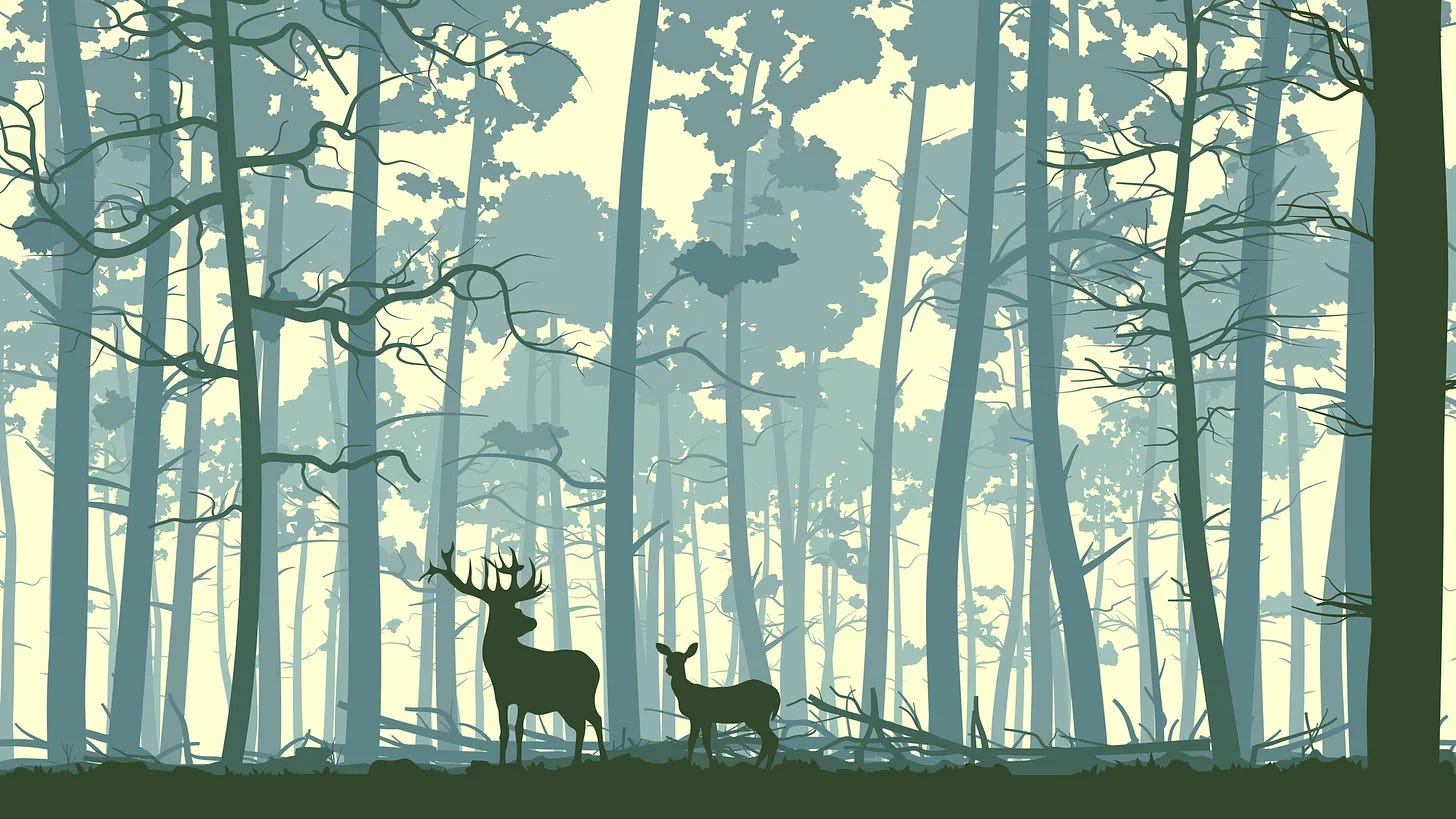How each Author Ecosystem writes to market
...and why you're probably doing it wrong.
Hi,
“Write to market” is one of the most common pieces of advice in publishing, and one of the most dangerous.
It gets tossed around like a universal strategy, like we’re all supposed to chase the same trends, make the same decisions, and build the same kind of books. But after working with thousands of authors I can tell you this that writing to market only works if you’re doing it in a way that’s aligned with how your brain naturally works.
When we created the Author Ecosystems framework, this was one of the first patterns we saw. Everybody was following the same advice, but only a small percentage of authors were actually seeing results.
The rest were burning out.
Not because they weren’t talented. Not because they didn’t care. But because they were trying to write like Deserts when they were actually Tundras, or trying to bend tropes like Forests when they should’ve been threading resonance like Aquatics.
It wasn’t a strategy problem. It was an ecosystem mismatch. You’re not broken if you can’t do it. You’re just trying to write to market like somebody else, and your ecosystem wasn’t built for it.
So, how does each ecosystem write to market? Let’s dive in.
Did you know we have a whole book on Author Ecosystems that’s free for paid members? It goes deep on each ecosystem on a wide range of topics.
🏜 Desert: “Strike Fast, Strike Now”
“This is what the market wants now, so this is what I’m going to deliver rapidly before the market changes.”
Deserts are the apex predators of “writing to market.”
They don’t wait. They don’t plan for three years from now. They look at what’s trending today, and start writing immediately. Their books are built to hit the moment and launch while the opportunity is still hot.
That means:
Short production cycles
Clear, commercial packaging
Lots of backlist
Ruthless data-driven decisions
Deserts don’t care if they’re passionate about the story. They care if the story sells. What’s fun for them is hitting the market exactly right. They write fast, launch hard, and repeat. Most Deserts don’t even expect their books to sell forever. The goal is to make money while it’s hot, then move on.
🌾 Grassland: “The Strategic Land Grab”
“This is where the market is going, and I want to own this topic so I can keep getting arbitrage on it forever.”
Grasslands don’t care as much about today’s trends, except in so much as current trends predict future ones. Instead, they’re building for next year. They’re the futurists, always scanning the horizon, always one move ahead.
Their version of writing to market is early adoption. They look at microtrends that are about to pop, identify a lane nobody’s owning yet, and stake a claim. They go deep, they go hard, and they stay long after the initial excitement has passed.
Their banking on the fact that if they can catch an emerging trend and become one of the top names in it, then they’ll be reaping the benefits for years to come.
Grasslands don’t build one book. They build systems. They’re not trying to hit the top of Amazon today. They’re trying to build compounding returns over time. They think in series, catalogs, evergreen funnels.
Grasslands often feel like slow starters, but once they lock in? They dominate. Not because they wrote the best book, but because they claimed the shelf space before anyone else.
❄️ Tundra: “The Pattern Builder”
“These are the 5-10 things this market has historically wanted. I’m going to add all of it to my next project so that everyone can get excited about it.”
Tundras are the curators. They love understanding the evergreen rules of a market and build series that align with that pattern. They’re not trying to chase new trends. They’re trying to build the definitive version of what people already love.
Tundras often write:
Cross-genre mashups that tick all the boxes
Crowd-pleasers with strong commercial bones
Market-informed passion projects
Kickstarter-perfect bundles with huge reader overlap
Where Deserts focus on timing, Tundras are building books to last. They often launch with bundles, early bird rewards, comp titles, and everything else that signals “I understand what you’re here for, and I’m delivering something everyone will love.”
That’s how they build excitement, which is their secret weapon. They pull all these different things people already love together into a mega-book that everyone will adore.
If you're always building the ultimate fan-service version of something you love, you're probably a Tundra.
🌲 Forest: “The Subversive Rebuilder”
“This thing the market wanted was fine before, but it’s stale now. What if I turned it on its head and got people excited about it again?”
Forests don’t want to chase the market, they want to evolve it. They see how a popular trend could be bent to address their core themes, but have to twist it into something new to make it happen.
Forests constantly hear “I don’t usually like X genre, but I love when you write it.” They are using the popularity of a genre to get eyeballs on a theme they care about by twisting it in a new way that makes people say “I never thought of it that way.”
They win by reviving interest in old tropes and writing about them in new ways. Forests often get told to be “less complicated” or “more commercial.” But the truth is, when a Forest project hits, it hits hard because it speaks to the readers who’ve read everything and are finally ready for something different.
🌊 Aquatic: “The Visionary Thread-Weaver”
“This market is finally ready for this idea. If I pull all these threads together from all these various places, I can show them something they’ve never seen before that’s going to blow their minds.”
Aquatics don’t chase trends. They track cultural readiness.
They watch ideas stack up until there’s just enough familiarity that readers can connect the dots. Then they thread them all together into something that feels fresh, layered, and completely unexpected.
When it works, it’s incredible, but it only works if the market has already absorbed the pieces. Otherwise, they just sound crazy.
Aquatic’s wait. They observe. And when the moment comes, they pull from everywhere from old IP and internet culture to niche genres and emotional hooks synthesizing something the market didn’t know it was starving for.
Unsuccessful Aquatics fail because they try to move before the cultural foundation is ready. They have the right ideas, but not the right timing, or not enough shared references to make it land.
Successful Aquatics know when the audience has absorbed enough to say “Oh my god, this is everything I love, all in one place. How did I not know I needed this?”
They write to market not by chasing what’s hot, but by pulling the threads that are finally ready to be tied together.
How to train like each Ecosystem (without burning out)
While you have a dominant Ecosystem, you also have all five Ecosystems inside you at all times. At any time you can choose to embrace a different ecosystem, but it’s hard if you’ve been doing things one way to completely shift your focus on a dime.
On top of that, you might just be wondering how each Ecosystem does it. So, if you want to build that range, here’s where I’d start:
🏜 To Think More Like a Desert:
Watch TikTok, Amazon, and subreddits daily. Don’t overanalyze — just observe what’s moving right now.
Practice fast, low-pressure writing sprints. Build your tolerance for speed.
Study KU blurbs, covers, and titles. Get fluent in what gets clicks.
Try a 10K novella launch just to ship something fast and unprecious.
Deserts operate on rhythm and reaction. You’re not trying to be perfect. You’re trying to build response time.
🌾 To Think More Like a Grassland:
Follow Publisher’s Weekly deal announcements to spot what’s trending two years out.
Track what midlist authors are building before it’s hot.
Pick a category nobody owns and commit to building your backlist around it.
Watch where the big trad houses are investing since that’s where they’ll be pushing a lot of attention to in the coming years.
Grasslands play the long game. Start watching like a strategist, not a fan.
❄️ To Think More Like a Tundra:
Build a database of successful tropes, titles, hooks, and offers in your genre that have always sold.
Practice constructing new projects using patterns that have proven appeal.
Look at Kickstarter and direct sales campaigns to see how Tundras stack value.
Study the presentation, not just the story.
Tundras don’t invent the blueprint. They refine it until it’s undeniable.
🌲 To Think More Like a Forest:
Identify overplayed tropes in your genre and challenge yourself to flip them.
Take a well-known story and write the “mirror version”, maybe villain instead of hero, tragic instead of happy, or grounded instead of epic.
Study authors like Tamsyn Muir, R.F. Kuang, or Gillian Flynn.
Practice delivering emotional satisfaction without the expected formula.
Forests make the familiar feel new again. Learn to subvert without losing the reader.
🌊 To Think More Like an Aquatic:
Spend time in fandoms, archives, weird corners of the internet.
Track patterns across formats like books, games, musicals, memes, anime, and fanfic.
Build a swipe file of ideas that shouldn’t work together… but kind of do.
Don’t pitch it yet, just collect. Let the idea gestate until the market’s ready.
Aquatics don’t follow trends. They assemble them. Slowly. Intentionally. And when the moment hits, they tie it all together.
You don’t need to become someone else’s ecosystem. You just need to understand how each one works so you can borrow what you need, when you need it, without burning your whole system down.
Most authors fail at “writing to market” because they’re using the wrong tools for their brain.
Once you know your ecosystem, you can stop trying to win someone else’s game.
And finally start building the kind of career that actually works for you.
If you want to learn more, paid members have complete access to our Author Ecosystem book.
What do you think?
Which transformation resonates most with the stories you write—or love to read—and why?
Have you ever experienced a book that shifted your worldview, reignited your passion, or helped you feel seen? What made it so impactful?
If you're an author, how would you describe the transformation your readers experience through your work?
Let us know in the comments.
If you enjoyed this one, I highly recommend checking our archive, with over 900 posts about how to help you build your own author career, including our course, fund your book on Kickstarter. You can take it for free with a seven-day trial, or give us a tip if you want to support us without committing long term.










